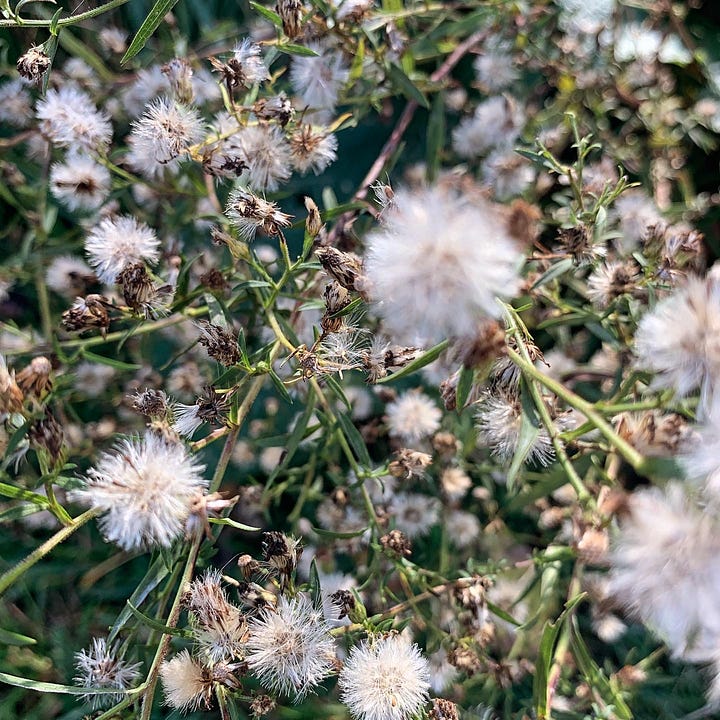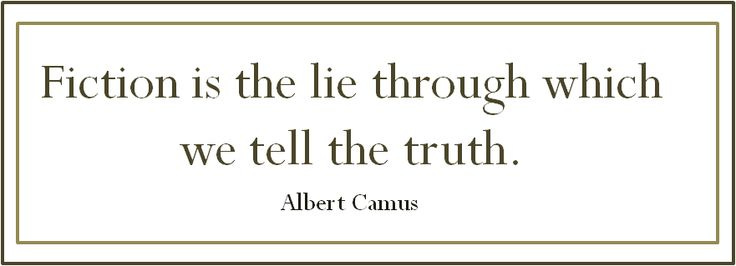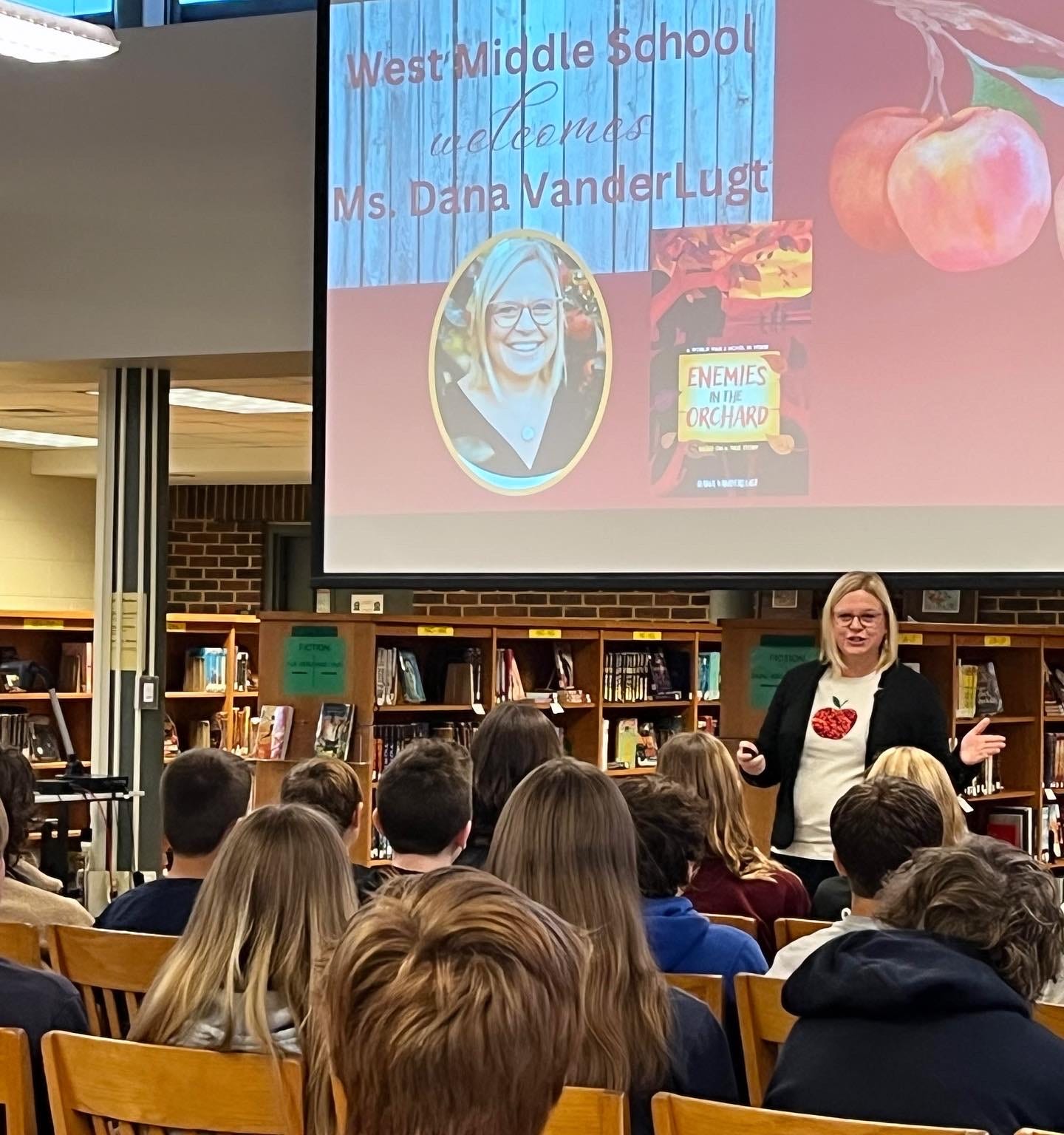I am always glad to hear from parents or teachers reading my book alongside their kids or students. While I wish war was a far-off concept for young readers, I know while adults are reading aloud historical fiction novels like my own, they are also answering questions about war in real time. About the war in Ukraine. About airstrikes and devastation in the Middle East. About shootings in our own country.
While talking with students last week, I asked them to fill in the blank: “Fiction is ____.” Each time, the group of students replied, loudly and in unison, “Fake.” But fiction isn’t fake, I tried to convince them. The characters may be made up. Unknown details may be filled in from the author’s imagination. But fiction—its emotions, its conflict, its complexity, it heartache—is very, very real.
Late last week, Enemies in the Orchard was reviewed by Meadow Rue Merrill, a middle and high school English teacher from Maine. Published in The Times Record out of Portland, Meadow’s review posted the same day of Lewiston tragedy, her words and excerpts from my book layered beneath the devastating news of violence and anguish.
The final words of Meadow’s review are haunting and heartbreakingly close: “Through her thought-provoking characters and lyrical verse, VanderLugt offers the hope that people who were once enemies can achieve a lasting peace by laying down their weapons, along with their prejudices, to embrace their common humanity — an important message for today.”
As I’ve written about before, though not simple or easy, I do believe that books are one of the safest places for young readers to deal with the pain and sadness of our world.
In a remarkable 2018 essay in Time Magazine that I return to over and over, Kate DiCamillo wrote about, “Why Children’s Books Should Be a Little Sad.” This portion of the essay especially sticks with me.
My childhood best friend read Charlotte’s Web over and over again as a kid. She would read the last page, turn the book over, and begin again. A few years ago, I asked her why.
“What was it that made you read and reread that book?” I asked her. “Did you think that if you read it again, things would turn out differently, better? That Charlotte wouldn’t die?”
“No,” she said. “It wasn’t that. I kept reading it not because I wanted it to turn out differently or thought that it would turn out differently, but because I knew for a fact that it wasn’t going to turn out differently. I knew that a terrible thing was going to happen, and I also knew that it was going to be okay somehow. I thought that I couldn’t bear it, but then when I read it again, it was all so beautiful. And I found out that I could bear it. That was what the story told me. That was what I needed to hear. That I could bear it somehow.”
So that’s the question, I guess, for you and for me and for all of us trying to do this sacred task of telling stories for the young: How do we tell the truth and make that truth bearable?
One way I think we make the truth bearable is by listening well and answering the earnest questions of young readers. Last week, I shared an essay on the Reformed Journal blog about my Q&A sessions in schools and how, thanks to questions about what a writer might do when they feel stuck, I was reminded of the necessity of “Starting Small.”
“When the world is full of pain, when apathy and overwhelm threatens, what is there to do? Maybe, again, to start small. To take care of our own little corner, repeat an extra prayer, be extra kind to the waitress, slow down long enough to notice the brilliance of the fall leaves at our feet.”




Returning to Kate DiCamillo, don’t miss this recent conversation between Kate and her good friend and fellow writer, Ann Patchett at the Library of Congress. Ann spoke about why it took her so long to find children’s literature, and particularly Kate’s books: “I grew up at a time before children’s literature was invented. I had no appreciation for it. In my day, we went straight from Pat the Bunny to John Updike.”
While a beautiful conversation between two friends, their talk is another reminder that good books written for children are also good books for adults. At the end of the talk, when asked for advice, Kate tells an audience member to “Write to fill the hole in your own heart.” I think we read for the same reasons.
Finally, if you’ll allow me to share a few other quick bits of book-related updates:
Though we are in the final days of October and snow is in the forecast, you can hold onto fall with a few more book events coming up. I’ll be leading a poetry workshop at Bluestocking Bookshop in Holland on Saturday, Nov. 3. (All ages welcome!) Also, keep an eye out for more details about a live Zoom event with Jimmy Pappas and the Poetry Society of New Hampshire on Monday, Nov. 13.
If you’ve read Enemies in the Orchard, and you’re willing, your reviews on Amazon and Goodreads are incredibly helpful! I’m so appreciate of those of you who have already shared kind and encouraging words.
I’m continuing to book school visits, which I enjoy so much! Feel free to share my information with teacher and librarian friends. While I can book in-person visits to local schools, I’m happy to jump online to chat with students far from Michigan. I also love to hear from readers of all ages. Please don’t hesitate to reach out.
With both gratitude for you and heartbreak for our hurting world,
Dana








Thank you so much for this!